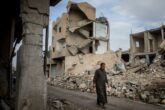December 16, 2022
A Democratic Iran Is Coming and It Will Lead the Middle East
A 44-year epoch in the greater Middle East may be coming to an end, as the region begins to turn on its axis. In early 1979, a radical Islamic regime under Ayatollah Ruhollah Khomeini toppled Shah Mohammed Reza Pahlavi in Iran, spreading revolutionary turmoil throughout the Levant and challenging the conservative Gulf Arab monarchies. The region was never the same, as Iranian-backed militias aggravated existent civil wars and started new ones.
Domestically, Iran has spent the past few decades as a bleak, repressed and relatively impoverished society. Henry Kissinger told me that had the Pahlavi dynasty remained in power, Iran, given its strong state and civilizational richness, would have evolved into a constitutional monarchy with an economy comparable to South Korea’s.
Because Iran constitutes the Middle East’s geopolitical pivot point, nothing has the potential to change the region as much as a more liberal regime there
Now, the regime has been rocked by months of widespread protests against wearing the hijab, unrest cutting across economic, educational and regional divisions. Cracks are starting to appear in the Islamic Republic’s power structure. Because Iran constitutes the Middle East’s geopolitical pivot point, nothing has the potential to change the region as much as a more liberal regime there in the coming months or years.
Whereas many Arab countries that fell into chaos during the Arab Spring have artificial borders drawn by Europeans — rather than being strong historical states, they are merely vague geographical expressions — there is nothing artificial about Iran. With a highly educated population of 85 million, larger than any Arab country save for Egypt, Iran is synonymous with the Iranian plateau, one of the region’s critical geographical features. The plateau overlooks and influences Mesopotamia to the west and Central Asia to the northeast.
Read the full article from Bloomberg.
More from CNAS
-
Our Man in Damascus? Sanctions and Governance in Post-Assad Syria
The complexity of the legal and policy issues presented by the sanctions thicket surrounding Syria—and the disparate authorities responsible for various parts of it—will requi...
By Alex Zerden
-
Cryptocurrency in the War Zone: A Closer Look at Recent Events in Syria
Syria’s political fate remains in flux, both internally and in terms of its relations with key regional powers....
By Eitan Danon
-
Syria: What Happened and What Comes Next
After more than a decade of civil war involving major interventions from foreign powers, over the past week a rebel alliance incredibly rapidly gained control of city after ci...
By Richard Fontaine
-
Washington Needs a New Syria Policy Right Now
It is well past time for Washington to demonstrate leadership, advance its global and regional interests, and support the freedom and future of the Syrian people....
By Jonathan Lord




